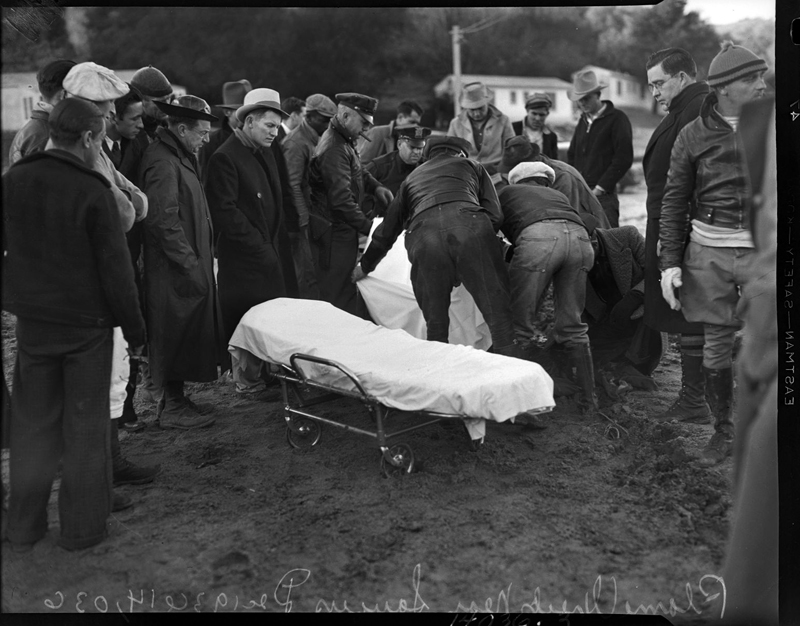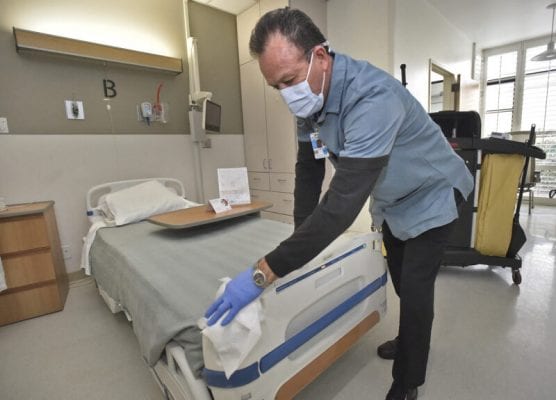The fight against COVID-19 on the frontlines paints a complex, busy image: There’s a sea of scrubs and isolation gowns scrambling through hospital hallways and intensive care units as nurses and doctors tend to some of the most high-risk infection cases.
But between the battle of care and disease is another group of frontline workers who have doubled down efforts in protecting both caregivers and patients.
At Henry Mayo Newhall Hospital, they’re the housekeeping crews, referred to as environmental services workers, and they were among the first to get the Pfizer-BioNTech COVID-19 vaccines.
Rosalina Gonzalez, a mother of three children who are 18 years and younger, described Wednesday that receiving the vaccine felt as if she was inoculated with a boost of energy after what has been a scary and nerve-wracking year in ground zero of the pandemic.
“I received the vaccine, but before I felt scared and anxious and I didn’t feel excited to go to come to work, because I was scared that I would get infected and give it to my kids,” she said in Spanish. “I feel grateful that they gave me the vaccine. It’s like they injected me with energy.”
More importantly, she added, is that after receiving protection with the second required dose, she’ll feel “more comfortable to hug my girl and boy.” An FDA study of the Pfizer-BioNTech vaccine showed a 95% efficacy rate after the second dose.
Gonzalez is among many housekeepers and custodians on the housekeeping crews meticulously disinfecting and tidying up the COVID-19 unit at the hospital.
“We put on more gowns, more gloves, more masks than ever before when we enter a new COVID room, but that’s what it takes to stay protected and to keep others safe,” Gonzalez said.
For custodian Jesus Florido, seeing the important work nurses and doctors have taken on has given him a sense of encouragement to continue providing essential housekeeping services.

Environmental Service worker Jose Acevedo sanitizes an acute rehab room at Henry Mayo Newhall Hospital in Valencia on Thursday, December 24, 2020. | Photo: Dan Watson / The Signal.
“Before I was feeling fine but now with the vaccine, I feel much better, more encouraged to keep going,” he said.
From swapping out used bed linen with fresh ones to mopping the floors and taking out the trash, these are essential housekeeping tasks that help everyday operations at the hospital, especially amid a winter surge and uptick in staffing demands across Los Angeles County, run a little smoother and safer, according to Sarah Stoddard, a registered nurse and in clinical informatics at Henry Mayo, who confirmed environmental services workers were among the 1,606 vaccinated personnel.
A recent uptick in diagnoses has had a devastating impact on the county, including at Henry Mayo, with record-breaking numbers in cases, hospitalizations and deaths. In the last week of November, the county experienced an average of 5,900 new cases but to date, the figure is about three times that.
“They are absolutely part of the first group to get the vaccine,” she said. “The (Centers for Disease Control and Prevention) and Public Health have robust guidelines in terms of administering vaccination and our crews are included.”
Environmental Service worker Jose Acevedo, who lives with his wife and grandchildren and regularly mops floors and sanitizes rooms, reiterated the importance of not letting one’s guard down even after vaccination.
The three, as with all those who have received the Pfizer-BioNTech vaccine, are awaiting their second dose.
“With the vaccine, you do feel a lot better but I think, first of all, it’s about staying protected,” Acevedo said in Spanish. “I advise everyone that if they get the vaccine, for good or for bad, to protect yourself because you’re also protecting those around you, those with kids and families.”
Like this:
Like Loading...
Related





 Tweet This
Tweet This Facebook
Facebook Digg This
Digg This Bookmark
Bookmark Stumble
Stumble RSS
RSS



























REAL NAMES ONLY: All posters must use their real individual or business name. This applies equally to Twitter account holders who use a nickname.
0 Comments
You can be the first one to leave a comment.